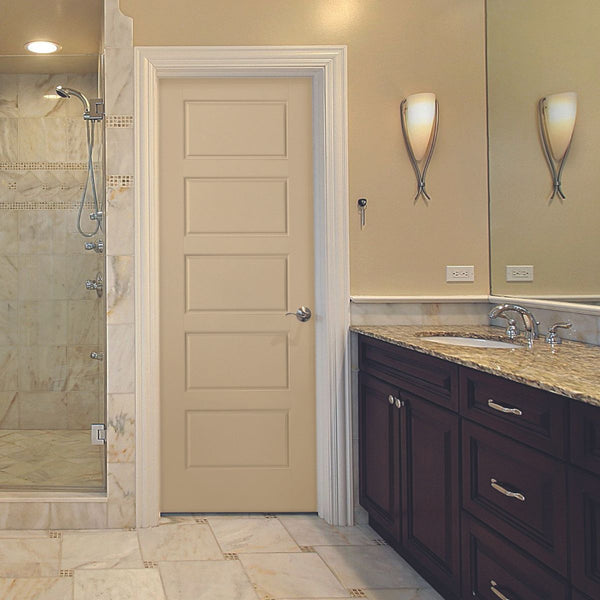Privacy vs. Style: Choose the Right Door for Your Space
Jan 14, 2025
Choosing the right door can be an overwhelming task, and this guide is intended to help ease the process. There are several factors to consider when selecting the right door for your space, including how much privacy you’ll require, whether or not you need natural light, and how much room you have for the door to swing. Keep reading to help you pinpoint exactly what you need!
Desired Privacy Level
Some spaces, like bedrooms or bathrooms, require higher levels of privacy. Although style is important and aesthetics should be considered, the amount of privacy needed should take priority in your decision making.
Light Flow
Glass doors and frosted panes allow natural light to flow through from one space to another, which can do wonders for opening up a home and making it feel larger than it is. However, with all that light, you do sacrifice a bit of privacy. Think through how the room or space will be used on a day-to-day basis, and whether light or privacy is more important to you.
Soundproof Level
Before you select a door, it’s important to consider how soundproofed you need the room to be. The materiality and style of door will determine how much sound it blocks out. A home office and bathroom would likely benefit from a high level of soundproofing, but it isn’t a top-level concern for a pantry. Think of how you use the space realistically before you decide.
Doorway Opening
The amount of space you’re working with will have a huge impact on the door you choose. Consider how much “swing” space you have in your door opening—and don’t forget to factor in surrounding furniture and hallway flow. For example, a dining room may call for French doors, but is there room for the door to open into the dining room without hitting a chair? On the other hand, a closet-style laundry room may require a sliding barn door or bifolds. Your specific needs and space will dictate your solution.
RELATED READ: Which Way Should Your Door Swing?
Choosing the Right Doors for Home Offices
Since the global pandemic, home offices are now a common staple in the American home. With more and more people opting to work remotely, a dedicated office space that is decently soundproofed is a necessity now more than ever. Be sure to consider high-quality materials that are not on the flimsy side; a thick pine, cherry, or mahogany would be ideal. Whether or not you’d enjoy clear or frosted panes versus a fully paneled door will vary based on your line of work (and whether or not you have young children in the home!). If a more open look appeals to you, our 10 Lite French Interior Door is a beautiful choice. Tend to get distracted by what’s going on outside your office? Try a 2 Panel Shaker Style Interior Door for a timeless look.

Choosing the Right Doors for Bathrooms
For bathrooms, you want to maximize privacy while also considering spacing. Bathroom accesses through the bedroom are often slimmer than other doorways, and you need to factor in the door swing—few things are more irritating than a door than swings into the toilet! Our Single Panel Shaker Style Interior Doors are popular for bathrooms, and well liked for their simple, elegant design and high-quality construction.

Choosing the Right Doors for Your Pantry
Your pantry door will depend on your kitchen layout. Do you have a walk-in butler pantry, or do you need a bifold? Perhaps a barn door suits your wall best. Our Pantry Door is the perfect way to add a bit of charm to your kitchen, while our Single Panel Shaker Style Bifold Door gets the job done when space is limited.
Choosing the Right Doors for Your Laundry Room
Laundry rooms are unique in that they require more ventilation than other rooms in the house. With the frequent heat and humidity emitted from the machines, you need to factor in how to let that air escape. Large mudroom-style laundry rooms likely won’t need a vented or louvered door (we love the Laundry Room Door for this style!). If you have a smaller, closet-style laundry room, our Louver Over Raised Panel Bifold Interior Door is a smart choice.

RELATED READ: Do Laundry Rooms Need Louvered Doors?
To sum it up, choosing the right door is a delicate balance between functionality, home design, and personal taste. Hopefully, this guide has helped you narrow down your options and figure out exactly what you need. When you’re ready to find a door, take a look around!


